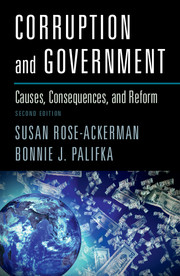Book contents
- Frontmatter
- Dedication
- Contents
- List of Figures
- List of Tables
- List of Boxes
- List of Acronyms
- Preface to the First Edition (1999)
- Preface to the Second Edition
- Acknowledgments
- INTRODUCTION
- PART I CORRUPTION AS AN ECONOMIC PROBLEM
- PART II CORRUPTION AS A CULTURAL PROBLEM
- PART III CORRUPTION AS A POLITICAL PROBLEM
- PART IV REFORM AGENDAS: DOMESTIC POLITICAL WILL AND INTERNATIONAL INFLUENCE
- CONCLUSIONS
- References
- Index
Preface to the Second Edition
Published online by Cambridge University Press: 05 March 2016
- Frontmatter
- Dedication
- Contents
- List of Figures
- List of Tables
- List of Boxes
- List of Acronyms
- Preface to the First Edition (1999)
- Preface to the Second Edition
- Acknowledgments
- INTRODUCTION
- PART I CORRUPTION AS AN ECONOMIC PROBLEM
- PART II CORRUPTION AS A CULTURAL PROBLEM
- PART III CORRUPTION AS A POLITICAL PROBLEM
- PART IV REFORM AGENDAS: DOMESTIC POLITICAL WILL AND INTERNATIONAL INFLUENCE
- CONCLUSIONS
- References
- Index
Summary
Since Corruption and Government was published in 1999 interest in the topic has burgeoned in both academic and policy circles. Empirical work, in particular, has flourished, with scholars and policy analysts devising clever techniques to measure and study a phenomenon that is inherently difficult to observe. My own institutional, political-economy approach to the study of corruption has, I believe, been vindicated by this newer work, and my 1999 and 1978 books have helped structure the debate. The 1999 book was translated into seventeen languages and has engaged activists and scholars worldwide. Nevertheless, even if the basic message of the book remains relevant, the text is outdated in that it reports only on scholarship and corruption scandals from before 1999. Thus, a second edition can inform the ongoing debate. In Bonnie Palifka, I have found an excellent co-author. Bonnie has taught courses based on the first edition for ten years at both Tecnológico de Monterrey in Mexico and at Yale, and she has a teacher's perspective on what needs to be expanded or better explained.
This new edition not only assesses the empirical bases for claims made in the first edition; in addition, it develops themes that were mentioned but not fully explicated in that volume. The new material deals with debates over the cultural bases of corruption, with corruption in democracies, and with reconciling corruption control and democratic values. We have added chapters on the criminal law, organized crime, and corruption in postconflict societies, and expanded the material on international anticorruption to reflect current developments. Corruption is a problem that has existed since the rise of organized states and that is not likely to disappear any time soon. However, some states and sectors have managed to become less corrupt over time. Although we cannot claim to provide a comprehensive literature review, we do try to incorporate new work that asks what lessons can be learned from both successes and failures of reform.
- Type
- Chapter
- Information
- Corruption and GovernmentCauses, Consequences, and Reform, pp. xxi - xxiiPublisher: Cambridge University PressPrint publication year: 2016



